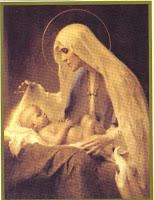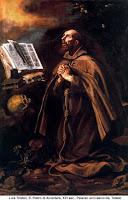 Whosoever fears God and keeps his commandments, is the servant of God. And in this service is not perfection, but the righteousness which leads to adoption. For this cause the prophets also and the apostles, the holy band whom God chose, entrusting to them the apostolic preaching, by the goodness of God the Father became prisoners of Christ Jesus. For Paul says, "Paul, the prisoner of Christ Jesus, called to be an apostle" (Eph 3: 1, Rom 1: 1): so that the written law works with us in a good servitude, until we are able to master every passion, and to become perfect in the good ministry of virtue through the apostolic state.
Whosoever fears God and keeps his commandments, is the servant of God. And in this service is not perfection, but the righteousness which leads to adoption. For this cause the prophets also and the apostles, the holy band whom God chose, entrusting to them the apostolic preaching, by the goodness of God the Father became prisoners of Christ Jesus. For Paul says, "Paul, the prisoner of Christ Jesus, called to be an apostle" (Eph 3: 1, Rom 1: 1): so that the written law works with us in a good servitude, until we are able to master every passion, and to become perfect in the good ministry of virtue through the apostolic state.For if a man draws near to grace, then Jesus will say to him, "I will no longer call you servants, but I will call you my friends and my brothers: for all things that I have heard of my Father I have made known unto you" (Jn 15: 15). For those who have drawn near, and have been taught by the Holy Spirit, have known themselves according to their intellectual substance. And in their knowledge of themselves they have cried out and said, "For we have not received the spirit of bondage again to fear, but the spirit of adoption whereby we cry, Abba, Father" (Rom 8: 15): that we may know what God has given us - "If we are sons, then we are heirs; heirs of God, and joint heirs with the saints" (Rom 8: 17).
My dear bretheren and joint heirs with the saints, not foreign to you are all the virtues, but they are yours, if you are not under guilt from this fleshly life, but are manifest before God. For the Spirit enters not the soul of one whose heart is defiled, nor the body that sins; a holy power it is, removed from all deceit.
Truly, my beloved, I write to you as to reasonable men, who have been able to know yourselves. For he who knows himself, knows God: and he who knows God, is worthy to worship him as is right.
-Saint Anthony
Saint Anthony (356) was a hermit and a great counselor to clergy, monks and lay people.





